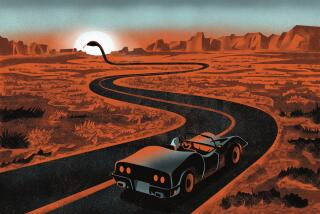Review: ‘The Gambler’ comes up short by failing to go all in
A remake of the 1974 film of the same name, “The Gambler” stars Mark Wahlberg as a man who charts a course of self-destruction aiming to reset his life by losing everything, having found life as a college literature professor born to a wealthy family too much to bear. Everybody’s got their problems.
The original film, directed by Karel Reisz from a script by James Toback that dovetailed a semi-autobiographical story with one by Dostoevsky and starring James Caan, is an example of the kind of pungent, atmospheric character studies now venerated as a golden age of 1970s American filmmaking. Relocated from New York to Los Angeles and directed by Rupert Wyatt (“Rise of the Planet of the Apes”) from a screenplay adapted by William Monahan (“The Departed”), the new version can be seen as aspiring to be an analogue to that earlier style, most interested in fashioning itself into an existential examination of modern manhood and its discontents.
Wahlberg lost about 60 pounds to hollow out his body for the role of Jim Bennett, who has unraveled as his dreams of being a novelist, or much of anything, have slipped away. Having lost himself in the cliff’s-edge rush of gambling — anything he can bet on — the momentary precipice where any outcome is possible, he has racked up a monumental debt to three separate underworld heavies, played with tangy zeal by John Goodman, Alvin Ing and Michael Kenneth Williams. He is given seven days to make good.
Bennett’s story seems rooted in some death-drive fantasy to strip away the trappings of identity and privilege, to start over from zero. Where Caan in the original came at the part with exuberant razzmatazz recklessness, Wahlberg never seems to be having any fun, choosing instead to amplify the character’s grim determination. By suppressing Wahlberg’s more typical sparkling unpredictability, this new reading of the character recasts him into someone more frustrating than free.
The character’s only solace comes from a promising student played by Brie Larson, the young actress who gained attention last year for her role as a troubled youth counselor in “Short Term 12.” There is a lightness, a liveliness, to Larson’s performance in distinction to Wahlberg’s heavy harrumphing. She is introduced by simply a look, her bright eyes recognizing Wahlberg without speaking when she sees him come into the underground gambling den where she works as a cocktail waitress. Larson’s bright presence pushes to the edges of the role, only underscoring the ways in which it is underwritten.
That he sees in her a freshness and potential still out in front of the compromises and limitations that have overtaken him seems clear, even as her own reasons for getting involved with someone in an obvious downward spiral remain opaque. The film’s lean toward romantic redemption is arguably its most significant change from the original, in which Lauren Hutton played a party girl ill-suited for Caan’s character of Axel Freed.
The story comes most alive in confrontational scenes between Wahlberg and Jessica Lange as his mother. There is a tension as Lange brings out a playfulness from Wahlberg, an undertone of brattiness, that is missing from the deflated weariness of the rest of his performance. Scenes of Wahlberg lecturing his students on literature and life, talent and failure are spirited and fun but feel tacked-on and a tad indulgent.
One wants to encourage filmmakers such as Wyatt and stars such as Wahlberg to step off the treadmill of mega-budget special-effects spectaculars to make films that explore the messy effects of human behavior. Yet taking creative risks, like gambling, means the possibility of failure. Throughout, it is as if the filmmakers are trying to have it both ways, making something that is alienating but not entirely so, walking up to the idea of being difficult without crossing into being unpleasant.
Wyatt, Monahan and Wahlberg never seem quite settled on what they want to say with the character or the story, so the film feels marked not by ambiguity but uncertainty. The original film at least had a sense of conviction in the way it steadily narrowed its focus on the character’s downfall, while the remake looks for wiggle room, an angle, an out. The new “The Gambler” comes up short by hedging its bets.
------------
‘The Gambler’
MPAA rating: R for language throughout, and for some sexuality/nudity
Running time: 1 hour, 51 minutes
In wide release. Opens Thursday.
More to Read
Only good movies
Get the Indie Focus newsletter, Mark Olsen's weekly guide to the world of cinema.
You may occasionally receive promotional content from the Los Angeles Times.







